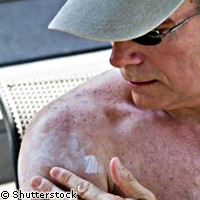Sunscreen serious threat to corals, EU study finds
A team of researchers of the Marche Polytechnic University in Ancona, Italy, have found evidence that sunscreens are to blame for coral bleaching. This loss of colour in the corals through the stress-induced release of symbiotic unicellular algae has negative impacts on biodiversity and functioning of reef ecosystems. The work, which is EU-funded, is published in the US journal Environmental Health Perspectives. The researchers tested the effect of sunscreen on three different coral species in locations in Mexico, Indonesia, Thailand and Egypt. Their tests showed that large quantities of algae and coral particles were released within 18 to 48 hours after exposure even to low quantities of sunscreen (10 microlitres per litre of seawater). After 96 hours, the bleaching was complete with higher temperatures speeding up the process. 'Different sunscreen brands, protective factors and concentrations were compared, and all treatments caused bleaching of hard corals, although the rates of bleaching were faster when larger quantities were used,' the scientists explain. The bleaching does not only result in the loss of photosynthetic pigments but also in decreasing membrane integrity in the algae. In addition, the analysis of surrounding seawater showed significantly elevated levels of virus occurrence, up to 15 times the amount found under normal circumstances. The researchers conclude that the viruses were released from the corals or algae and that sunscreen lotions might stimulate latent viral infections in this way. Coral bleaching is a global phenomenon that has increased considerably over the past 20 years and is normally associated with a change in temperature, excess ultraviolet radiation, pollution and bacterial pathogens. According to estimates, 4,000 to 6,000 tonnes of sunscreen are released in tropical reef areas every year by about 78 million tourists visiting those reefs. The researchers warn that up to 10% of the world's coral reefs might be at risk. Previous research has already found detectable levels of chemical compounds from sunscreen and other personal care products in seawater as well as fresh water. These compounds accumulate in aquatic animals, having effects similar to oestrogen. They also produce toxic by-products when they degrade. 'The impact of sunscreens would be expected to be crucial in atolls and coastal coral reefs with low water renewal and strong tourist vocation,' the researchers conclude. 'Our results provide strong scientific evidence of the potential impact of these products in tropical habitats and represent a pointer for outlining specific regulations for protecting coral reefs.' 'Because human use of tropical ecosystems and coral reef areas is progressively increasing, we can predict that the impact of sunscreens on coral bleaching will grow considerably in the future on a global scale,' the researchers add. 'Actions are therefore needed to stimulate research and utilisation of UV filters that do not threaten the survival of these endangered tropical ecosystems.' The research was financially supported as part of the projects CORALZOO ('The development of an SME-friendly European breeding programme for hard corals') and the REEFRES ('Developing ubiquitous restoration practices for Indo-Pacific reefs'), funded under the EU's Sixth Framework Programme (FP6).
Countries
Italy



